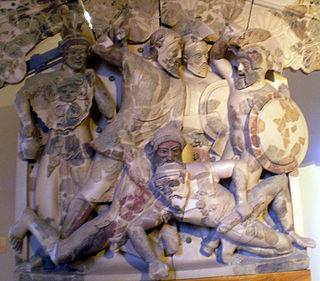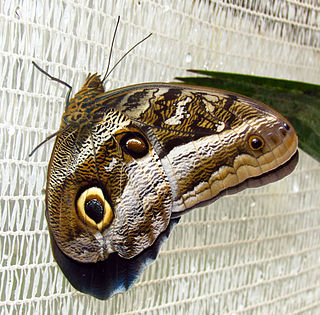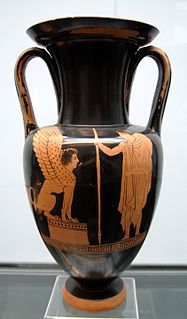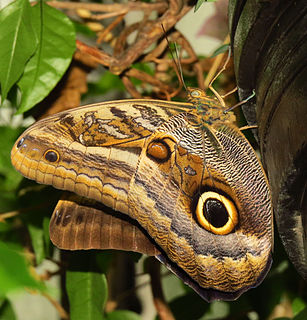
Sophocles is one of three ancient Greek tragedians whose plays have survived. His first plays were written later than, or contemporary with, those of Aeschylus; and earlier than, or contemporary with, those of Euripides. Sophocles wrote over 120 plays, but only seven have survived in a complete form: Ajax, Antigone, Women of Trachis, Oedipus Rex, Electra, Philoctetes and Oedipus at Colonus. For almost fifty years, Sophocles was the most celebrated playwright in the dramatic competitions of the city-state of Athens which took place during the religious festivals of the Lenaea and the Dionysia. He competed in thirty competitions, won twenty-four, and was never judged lower than second place. Aeschylus won thirteen competitions, and was sometimes defeated by Sophocles; Euripides won four.

In Greek mythology, Antigone is the daughter of Oedipus and either his mother Jocasta or Euryganeia. She is a sister of Polynices, Eteocles, and Ismene. The meaning of the name is, as in the case of the masculine equivalent Antigonus, "worthy of one's parents" or "in place of one's parents". She is the protagonist of the Sophocles play named for her.

Oedipus was a mythical Greek king of Thebes. A tragic hero in Greek mythology, Oedipus accidentally fulfilled a prophecy that he would end up killing his father and marrying his mother, thereby bringing disaster to his city and family.

A sphinx is a mythical creature with the head of a human, a falcon, a cat, or a sheep and the body of a lion with the wings of an eagle.

Oedipus Rex, also known by its Greek title, Oedipus Tyrannus, or Oedipus the King, is an Athenian tragedy by Sophocles that was first performed around 429 BC. Originally, to the ancient Greeks, the title was simply Oedipus (Οἰδίπους), as it is referred to by Aristotle in the Poetics. It is thought to have been renamed Oedipus Tyrannus to distinguish it from another of Sophocles's plays, Oedipus at Colonus. In antiquity, the term "tyrant" referred to a ruler with no legitimate claim to rule, but it did not necessarily have a negative connotation.

Oedipus at Colonus is one of the three Theban plays of the Athenian tragedian Sophocles. It was written shortly before Sophocles's death in 406 BC and produced by his grandson at the Festival of Dionysus in 401 BC.

The owl butterflies are species of the genus Caligo and are known for their huge eyespots, which resemble owls' eyes. They are found in the rainforests and secondary forests of Mexico, Central and South America.

The Theban Cycle is a collection of four lost epics of ancient Greek literature which tells the mythological history of the Boeotian city of Thebes. They were composed in dactylic hexameter verse and believed to be recorded between 750 and 500 BC. The epics took place before the Trojan War and centered around the Theban royal family.

The Gospel at Colonus is an African-American musical version of Sophocles's tragedy, Oedipus at Colonus. The show was created in 1983 by the experimental-theatre director Lee Breuer, one of the founders of the seminal American avant-garde theatre company Mabou Mines, and composer Bob Telson. The musical was a finalist for the Pulitzer Prize for Drama. The show had a brief run on Broadway in 1988.

The Oedipus complex is a concept of psychoanalytic theory. Sigmund Freud introduced the concept in his Interpretation of Dreams (1899) and coined the expression in his A Special Type of Choice of Object made by Men (1910). The positive Oedipus complex refers to a child's unconscious sexual desire for the opposite-sex parent and hatred for the same-sex parent. The negative Oedipus complex refers to a child's unconscious sexual desire for the same-sex parent and hatred for the opposite-sex parent. Freud considered that the child's identification with the same-sex parent is the successful outcome of the complex and that unsuccessful outcome of the complex might lead to neurosis, pedophilia, and homosexuality.

Caligo telamonius memnon, commonly known as the giant owl or pale owl, is a subspecies of butterfly of the family Nymphalidae. This subspecies can be found in rainforests and secondary forests from Mexico to the Amazon rainforest in South America.

Caligo idomeneus, the Idomeneus giant owl, is a butterfly of the family Nymphalidae. The species can be found in the Amazon rainforest and eastern Andes, from Venezuela to Ecuador, and south to the Mato Grosso in southern Brazil. The butterfly is named for Idomeneus, the leader of the Cretan army during the Trojan War.

Caligo brasiliensis, the Brazilian owl, sulanus owl, or almond-eyed owl, is a butterfly of the family Nymphalidae. The species can be found in most of South America as various subspecies, including Brazil, Colombia, Venezuela and Ecuador. Its range extends through Trinidad, Honduras, Guatemala and Panama north to Mexico.

Oedipus rex is an opera-oratorio by Igor Stravinsky, scored for orchestra, speaker, soloists, and male chorus. The libretto, based on Sophocles's tragedy, was written by Jean Cocteau in French and then translated by Abbé Jean Daniélou into Latin; the narration, however, is performed in the language of the audience.

Oedipus is a play by the 5th-century BCE Athenian dramatist Euripides. The play is now lost except for some fragments. What survives of the play covers similar ground as Sophocles' acclaimed Oedipus Rex, but scholars and historians have found there are significant differences. In Oedipus Rex, the title character blinds himself upon learning his true parentage, accidentally killing his father and marrying his mother Jocasta. In Euripides' play, however, it appears Oedipus is blinded by a servant of his father Laius, Oedipus' predecessor as king of Thebes. Furthermore, Euripides' play implies Oedipus was blinded before it was known that Laius was his father. Also, while in Sophocles' play Jocasta kills herself, remaining fragments of Euripides' play depict Jocasta as having survived and accompanied Oedipus into exile.

Caligo oileus, the Oileus giant owl, is a butterfly of the family Nymphalidae.

Caligo teucer, the Teucer owl butterfly is a butterfly of the family Nymphalidae. It was described by Carl Linnaeus his 1758 10th edition of Systema Naturae. It is found from Colombia and Venezuela to Bolivia and Paraguay. The habitat consists of rainforests and cloudforests at altitudes ranging from 400 to 1,400 meters.

Caligo telamonius is a brush-footed butterfly. The species was first described by Cajetan von Felder and Rudolf Felder in 1862. It is found in southern North America, Central America, and South America.

















